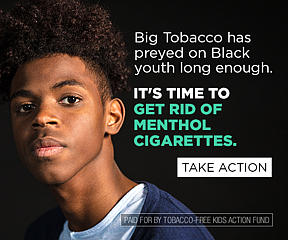TARGETED: CITY ORDINANCE SEEKS TO END FLAVORED TOBACCO SALES
Targeted: City ordinance seeks to end flavored tobacco sales
BY TIA CAROL JONES
A coalition of clergy, medical professionals, community organizers and elected officials have partnered to create and support an ordinance that would end the sale of flavored tobacco products. Among those products on the list are menthol, apple, strawberry and watermelon-flavored tobacco products.
By gearing the sale of these products towards young people, the coalition says this segment of the population is being encouraged to smoke cigarettes, hookah, flavored cigars and smokeless tobacco products.
Sponsors of the ordinance include Chicago Aldermen Stephanie Coleman (16th Ward), Roderick Sawyer (6th Ward), Michelle Harris (8th Ward) and Maria Hadden (49th Ward).
Bishop Horace Smith, M.D., pastor of Apostolic Faith Church, is also a pediatric oncologist, hematologist and a member of the Chicago Board of Health. Smith knows the implications and long-term effects of targeted tobacco products on young people.
“We all learned years ago what tobacco does, what nicotine does to people. It’s an addictive drug and it causes cancer. So, the issue of flavored and menthol tobacco cigarettes, I think, is clear in most literature,” he said. “It appeals to younger people who are first-time smokers, because it lessens the harshness of smoking, so it feels better to your throat. But Smith added, the fact of the matter is, these products are addictive. People in their 50s, 60s and 70s, who have chronic lung disease and lung cancer, started smoking when they were teenagers, Smith said. “I think there is a real issue of racial disparity in our health care,” Smith continued. “All of these things point to the fact that our young people are targeted by tobacco companies,” he said. “This is a health risk, there is no question about that. We’re going to have to do something about it, if we have the courage to do it.”
Smith added, overall, people will be healthier because of the ordinance and said he hopes it will pass. “If you can prevent people from smoking early on, the number of people who die from lung cancer and chronic lung disease and [who] have to carry around an oxygen tank, is going to diminish greatly because the damage begins early,” he said. “It’s much easier to prevent a disease than it is to treat it.”
Dr. Phoenix Matthews is an associate dean for equity and inclusion in the College of Nursing at University of Illinois-Chicago. They said the ordinance is building on a national trend towards the reduction of smoking among youth by removing the flavors that are responsible for increasing youth interest in the products.
“We’re hoping this ordinance will go through and be one of the most comprehensive in the country, in that it does not do what other cities and municipalities have done, and that is to exempt one very popular flavoring, and that is menthol,” they said.
Father Michael Pfleger, of St. Sabina Church, who said he agrees with the ban, added targeting young people with these products is a device that has been used for years. Pfleger called the push for flavored and menthol tobacco an “old trick” that he said, “must be stopped.” Pfleger, who emphasized the importance of banning flavored tobacco products added he’s asking all Chicagoans to come together to make sure that the ordinance moves forward now.
Latest Stories
- Oboist Receives Support From Initiative Geared Toward More Diversity In Classical Music
- Glodean Champion Launches "The Process to LOVE™"
- Sundial Media & Technology Group and Creator Currency Networks Launch CreateHer Network to Address $31.8 Trillion Women Creator Economy Gap
- Illinois Peace Project Debuts the 2025 'Peace Portraits’ Honorees
- DCASE Brings Two Major Exhibitions to the City of Chicago This Summer: Fabiola Jean-Louis’ Waters of the Abyss and Blondell Cummings: Dance as Moving Pictures
Latest Podcast
STARR Community Services International, Inc.

